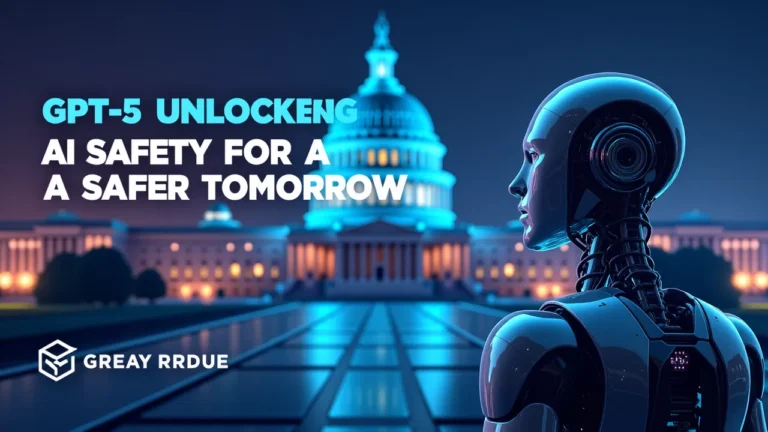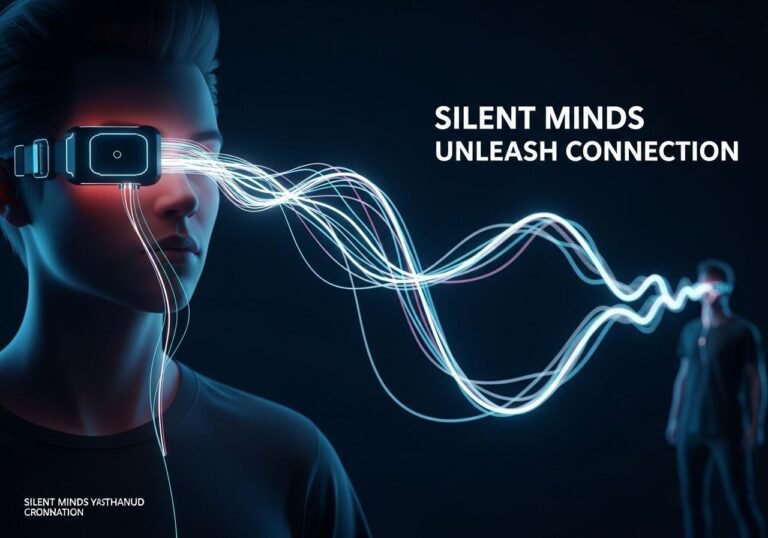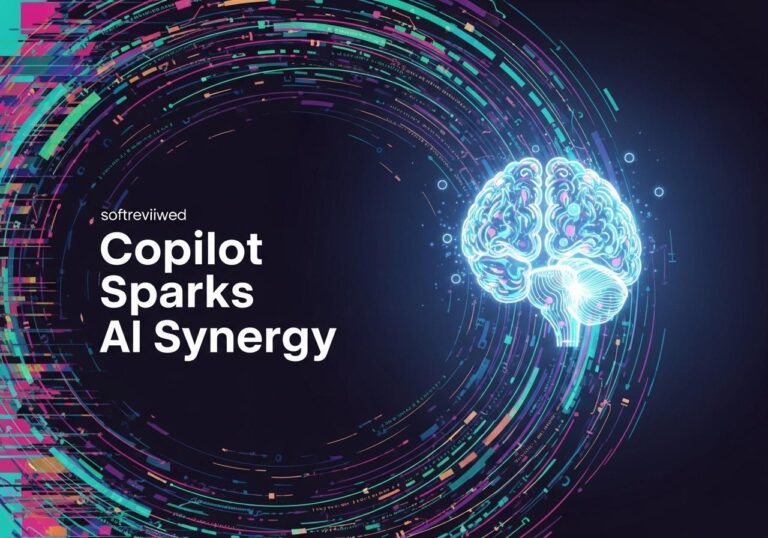OpenAI’s GPT-5: A New Era of AI Collaboration
Exploring the implications of OpenAI granting early access to GPT-5 to the US government
Government Access to GPT-5
OpenAI has granted the US government early access to GPT-5, fostering collaboration on safety evaluations.
AI Safety at the Forefront
The partnership aims to address growing concerns about AI safety and develop robust evaluation methods.
Government-AI Collaboration
This collaboration marks a significant shift in AI development and regulation, with implications for future AI governance.
Ethical Considerations
GPT-5’s development raises questions about responsible use, safeguards, potential misuse, job displacement, and creative output.
Privacy and Oversight Concerns
The partnership raises concerns about data privacy and government overreach, questioning access to GPT-5’s inner workings.
Global Implications
This collaboration has global implications, potentially sparking a new era of AI nationalism and raising questions about future AI development and regulation.
OpenAI Grants U.S. Government Early Access to GPT-5: What It Means for AI Safety
In a stunning development, OpenAI has provided the U.S. government early access to its next-generation AI model, GPT-5. This unexpected move marks a significant shift in the landscape of artificial intelligence development and regulation. As the world grapples with the implications of increasingly powerful AI systems, OpenAI's decision to collaborate with federal authorities raises questions about the future of AI governance and the delicate balance between innovation and safety.
A Strategic Move for AI Safety
The announcement came directly from OpenAI CEO via the social media platform X, where he revealed the partnership with the U.S. AI Safety Institute. This collaboration aims to push forward the science of AI evaluations, according to Altman. But what does this really mean for the future of AI?
It's a strategic move that addresses growing concerns about AI safety and the need for robust evaluation methods. The U.S. AI Safety Institute, established under the National Institute of Standards and Technology (NIST), is tasked with developing guidelines for AI measurement and policy. By involving this federal body in the early stages of GPT-5's development, OpenAI is sending a clear message—they're taking safety seriously.
The Timing: Why Now?
The timing of this announcement is particularly intriguing when we consider recent events at OpenAI. Earlier this year, the company made headlines when it disbanded its Super Alignment Team, a group dedicated to ensuring AI systems align with human intentions. This decision led to the departure of key figures like Jan Leike and Ilya Sutskever, who expressed concerns about the company's direction and resource allocation.
These internal shakeups raised eyebrows in the AI community. Critics questioned whether OpenAI was prioritizing rapid development and commercialization over safety concerns. The partnership with the U.S. AI Safety Institute could be seen as a direct response to these criticisms—an attempt to reassure both the public and industry insiders that safety remains a top priority.
A New Era of Government-AI Collaboration

The collaboration with the U.S. government isn’t entirely unprecedented in the AI world. Last year, OpenAI and DeepMind shared AI models with the UK government, indicating a growing trend of cooperation between AI developers and regulatory bodies. However, the scale and potential impact of GPT-5 make this latest partnership particularly noteworthy.
With AI evolving at a breakneck pace, the need for robust security measures becomes increasingly critical. OpenAI's recent appointment of retired General Paul M. Nakasone to its board, tasked with overseeing security and governance efforts, underscores the company's recognition of this fact. Nakasone's background in cybersecurity brings valuable expertise to the table, but it also raises questions about the militarization of AI and the potential dual-use nature of these technologies.
Ethical Considerations in the Age of Advanced AI
The implications of GPT-5's development extend far beyond the realm of technology. As AI systems become more sophisticated, their potential to reshape industries and society as a whole grows exponentially. From healthcare and education to finance and creative industries, the ripple effects of advanced language models are already being felt. But with these advancements come serious ethical considerations.
How do we ensure that AI systems like GPT-5 are used responsibly? What safeguards need to be in place to prevent misuse or unintended consequences?
These are questions that the partnership between OpenAI and the U.S. AI Safety Institute will need to grapple with. The development of GPT-5 also raises important questions about the future of work and human creativity. As language models become increasingly capable, there are concerns about job displacement and the potential homogenization of creative output. How will society adapt to these changes? And what role will policymakers play in shaping this transition?
Privacy Concerns and Government Oversight
However, this collaboration also raises questions about data privacy and the potential for government overreach. How much access will federal authorities have to the inner workings of GPT-5? And what safeguards will be in place to protect user data? These are issues that will likely be closely scrutinized in the coming months.
The global implications of this partnership cannot be overstated. As the United States takes a more active role in AI development and regulation, how will other countries respond? Will we see a new era of AI nationalism, with different nations racing to develop their own advanced language models? The geopolitical ramifications of AI development are becoming increasingly apparent, and GPT-5 could be a flashpoint in this evolving scene.
What Implications Does Early Access to GPT-5 Have for OpenAI’s Research and Development Accessibility?
Early access to GPT-5 empowers researchers by democratizing advanced AI technologies. This shift signifies a pivotal moment where openai research accessible to all can accelerate innovation and collaboration. As diverse voices engage with GPT-5, the potential for groundbreaking applications and solutions across various fields expands exponentially, fostering a more inclusive tech ecosystem.
Impact on Smaller AI Companies
It's also worth considering the potential impact on smaller AI companies and startups. As giants like OpenAI forge closer ties with government bodies, will this create barriers to entry for new players in the field? The AI industry is already dominated by a handful of large companies, and this trend could further consolidate their power.
The ethical implications of GPT-5's development extend beyond issues of governance and regulation. As language models become more sophisticated, questions about AI consciousness and rights are likely to come to the forefront. While GPT-5 is not expected to achieve true sentience, its advanced capabilities may blur the lines between human and machine intelligence in ways that challenge our existing ethical frameworks.
The Role of Public Policy
OpenAI's collaboration with the U.S. AI Safety Institute also raises questions about the role of private companies in shaping public policy. As AI systems become increasingly integrated into critical infrastructure and decision processes, their influence on the world will grow. How society grapples with the far-reaching implications of these technologies remains to be seen.
But amidst all the excitement and concerns surrounding GPT-5, it's important to remember that AI is ultimately a tool created by humans for humans. How we choose to develop and deploy these technologies will shape the future of our society in profound ways.
Conclusion
OpenAI's partnership with the U.S. government to develop GPT-5 marks a significant moment in AI history. By addressing safety concerns and involving regulatory bodies early, OpenAI is positioning itself as a responsible actor in the AI space. However, this collaboration brings up numerous questions about privacy, access, and the future landscape of AI development. As we move forward, it's crucial to balance innovation with ethical considerations and ensure that AI serves the greater good. The implications of OpenAI’s latest AI developments extend beyond technology; they touch on societal norms and individual rights. As these innovations unfold, ongoing dialogue among stakeholders—including technologists, ethicists, and the public—is essential to navigate the complex ethical terrain. Only through collaborative efforts can we ensure that advancements in AI foster inclusivity and equity, rather than exacerbate existing disparities.
What are your thoughts on this partnership and its implications for the future of AI? Let us know in the comments below. For more interesting topics, make sure you watch the recommended video that you see on the screen right now.
GPT-4 Key Aspects Overview
This chart illustrates the key aspects of GPT-4, including its capabilities, safety concerns, government involvement, and user access limits.







